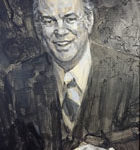
We choose, or lapse into, our capacities for giving and receiving. If wise we balance our lives so to gain not only what we need to do, but how we will believe and perform. This has implications for just about everything we are and mean to become. We determine, or fall into, a pattern that includes the public/privacy of our daily lives, the spending/savings of our stewardship, the needs/desires of our personalities, the disciplined/casual factors we decide to follow – and other comparisons/contrasts that taken together determine the course of life for us in style, values and meaning related to desired ends. They form our characters, personalities, activities – all summarized as the degree of maturation that we gain for… Read more







